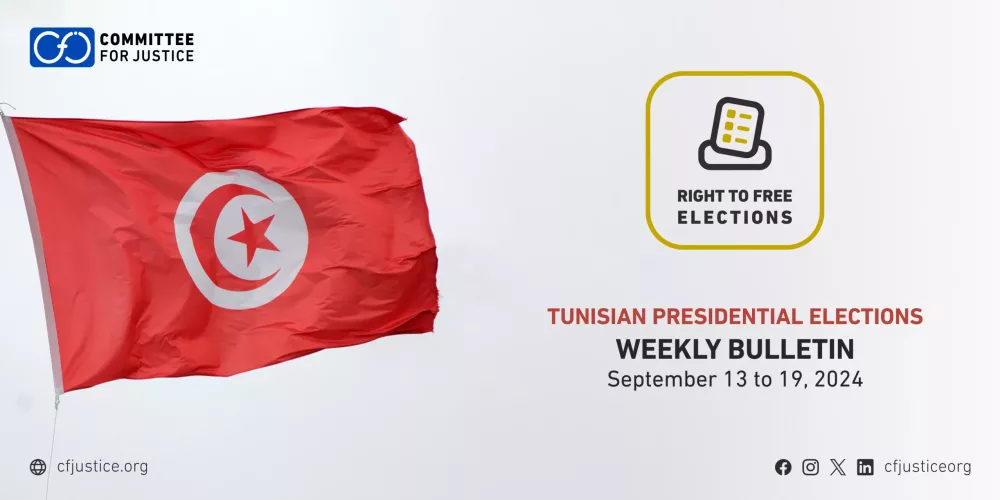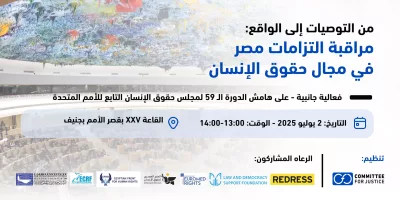As part of its ongoing monitoring of the 2024 Tunisian presidential elections, the Committee for Justice (CFJ) has released its weekly report covering the period from September 13 to 19, 2024. The report provides an overview of recent developments, including human rights and legal violations, as well as the challenges faced by candidates and the actions taken by authorities that affect the integrity of the electoral process.
– Popular movements to defend the gains of the “Jasmine Revolution”:
On September 13, 2024, Tunisia witnessed a large popular march organized by the Tunisian Network for Rights and Freedoms. The demonstration condemned the political authorities’ attempts to limit public freedoms and rights gained since the December 17 Revolution. Protesters expressed concerns over the decline of civil and political liberties, along with economic and social violations. These protests come amid increasing political and social tension as the presidential election approaches.
– Warnings about media content management:
On the same day, the Tunisian National Syndicate of Journalists issued a warning about the existence of a secret room controlling media content in a propagandist manner that serves political interests. The syndicate described this as a blatant violation of the principles of independent journalism and professional ethics. This came after a report aired on Tunisian National Radio, which was accused of glorifying President Kais Saied’s agenda. Several journalists expressed their rejection of the pressures being placed on them to convey pro-president messages.
– Ongoing violations and verdict against candidate Ayachi Zammel:
Presidential candidate Ayachi Zammel, who has been imprisoned for some time, posted a message on Facebook on September 14, 2024, expressing his frustration at being prevented from launching his election campaign. On September 18, Zammel announced that he would boycott the ongoing investigations against him, citing ongoing repression and political trials that prevent him from exercising his electoral rights. In the same context, the Jendouba Court of First Instance sentenced him to one year and eight months in prison in a case related to forgery of endorsements.
– Movements and statements from excluded candidates:
After the Administrative Court accepted the appeals of some excluded presidential candidates, including Mondher Zenaidi, pressure mounted on the electoral authority to implement the court’s decisions and include these candidates in the final list. Several politicians and activists, including Abdelatif Mekki’s campaign manager, warned that the electoral commission’s failure to comply with the court’s rulings could undermine the legitimacy and integrity of the elections.
– Accusations of forgery against Qais Saied:
On September 17, 2024, the Mahdia branch of the Tunisian League for Human Rights received a complaint alleging that endorsements for President Qais Saied had been forged. According to the complaint, one of the president’s supporters used personal data from a group of citizens to endorse Saied without their knowledge. An investigation was opened, but as of now, the complainants have not been heard, raising questions about the seriousness of the inquiry.
– Criminal complaint against the head of the electoral commission:
On September 16, 2024, the organization “I Watch” filed a criminal complaint against the head of the electoral commission, Farouk Bouaskar. The complaint relates to the commission’s failure to comply with court rulings issued by the Administrative Court, which ordered the inclusion of three additional candidates on the final electoral list. The organization called for an immediate investigation into these violations, which undermine the credibility of the electoral process.
– Challenge to campaign spending limits:
The legal committee for candidate Zouhair Maghzaoui’s campaign announced that it had filed a lawsuit challenging the government’s decree setting a cap on campaign spending. This legal action is part of broader efforts to challenge the legitimacy of certain administrative decisions related to the electoral process, arguing that they exceed the limits of authority.
– President Qais Saied’s criticism of protesters and dismissal of officials:
In a statement issued on September 19, 2024, outgoing President Qais Saied sharply criticized protesters opposing his policies, describing them as “paid mouthpieces.” He also decided to dismiss the President and General Director of Tunisian Television, Awatef Dali, appointing Chokri Ben Naceur as her replacement. This surprising decision comes amid rising controversy over the independence of the media in the country.






